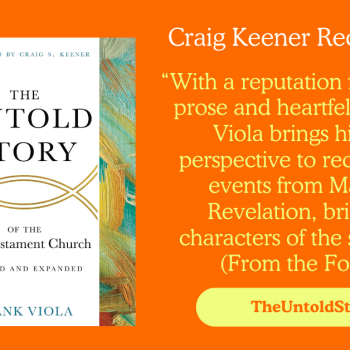The story is told about Peter interviewing three new arrivals in heaven.
Peter, you see, was deeply concerned about religious literacy and he had become convinced that Christians were arriving with little or no knowledge of their faith. Turning to the first of the three new arrivals, he asked, "What does Christmas mean to you?"
The new arrival responded, "Santa comes down the chimney and leaves gifts. We have a big family dinner and we all have fun."
Disappointed, Peter turned to the second arrival, "What can you tell me about Easter?"
"Oh, that's easy," the second arrival responded, "the Easter bunny hides eggs, we have a big family dinner and everyone has fun."
Now, convinced that things were really very bad, Peter turned to the third arrival and said, "Can you tell me anything more about Easter?"
To which the third arrival responded, "It's the day that we celebrate the resurrection of our Lord."
"Go on," Peter said, suddenly encouraged.
Eagerly the new arrival added, "And when Jesus comes out of the tomb, if he sees his shadow, we have three more weeks of basketball."
Easter, or what the Eastern Orthodox tradition calls "The Great Passover," is considered the central celebration of the Christian tradition. But the number of misleading metaphors, cultural accretions, and bad sermons on the subject could leave a stranger to the Christian faith wondering why we celebrate it at all.
I once thought it might be difficult to say something new and helpful year after year about Easter. I now realize that the real problem is finding anything that is faithful to the church's celebration or worth hearing at all. By the time I've waded through bunnies, butterflies, and sermons that use resurrection as a metaphor for breathing life into political causes and programs of self-improvement I am ready for silent retreat.
So, over the next few weeks I'd like to spend a bit of time talking about the spiritual consequences of Easter. After all, we have most of the fifty days of Easter ahead of us. There is still time to unwind a bit of the nonsense and put Peter's mind at ease. This week, Easter truth number one:
The power of death is destroyed and God has been vindicated.
We are confused about the nature of death. We describe it as "natural," as part of a process. I have even heard counselors describe it as a "friend." We don't really believe that, of course. That's why we are in a mad dash to deny death as often and as widely as possible.
You can see it everywhere. From the efforts we make to stay young to the strange promises we make to ourselves medically. We're not afraid of death. No, we just don't want to be there when it happens. (Thank you, Woody Allen.)
Not Paul—not Jesus. For them death is the last enemy. See, for example, 1 Corinthians 15:12-28. Why? Because death is unpleasant? Because it separates us from those we love? Because it appears to put an end to our life's efforts, pursuits, and relationships?
No. Not really. Those are the symptoms of death, to be sure—the collateral damage, if you will.
No, the real reason that death is the last enemy according to Paul is because death is the final, the last, the big contradiction to the claim that God is the author of life—that God is God.
That may come as a bit of a surprise. We tend to think that the Resurrection is all about us. In fact, we tend to read the whole biblical story with us—with you and me, with humankind—at the center of the story.
Read that way, the biblical story is this: God made humankind. Humankind was perfect. Humankind screwed up. As punishment, humankind began dying. That was sad and unpleasant. So, God in the person of Jesus Christ came into the world to fix us and—in the Resurrection—reverse the death sentence. The fundamentalist reading of this narrative emphasizes the salvation of the individual, the progressive narrative emphasizes social reform and prefers to talk about resurrection in metaphorical categories. But both are anthropocentric readings of the Gospel and it's a compelling way to tell the story, because we are at the center of it.
But that's not the biblical story. The biblical story is this: Chaos was on the face of the deep—and lots of things claimed to be God. But God ordered the world and on the first day, he created this god and this god and this god. And on the second day, God created this god and this god and this god . . . all the way through six days—meaning God is God, not trees, not animals, not stars. Then God said, what better way is there to make it known that I am God, than to put my image smack dab in the middle of it all, so God made humankind, male and female. But to make humankind in the image of God meant giving you and me freedom, and freedom involves the ability to worship God, or worship ourselves (or lots of other things). And because we love us and lots of other things more than God, we often worship ourselves.





